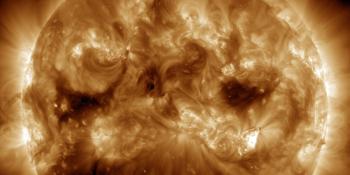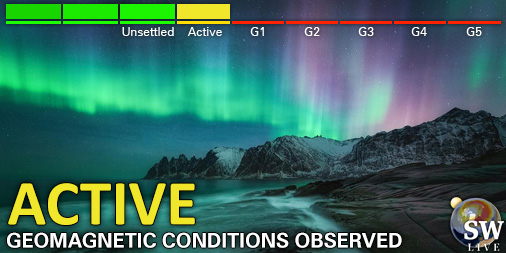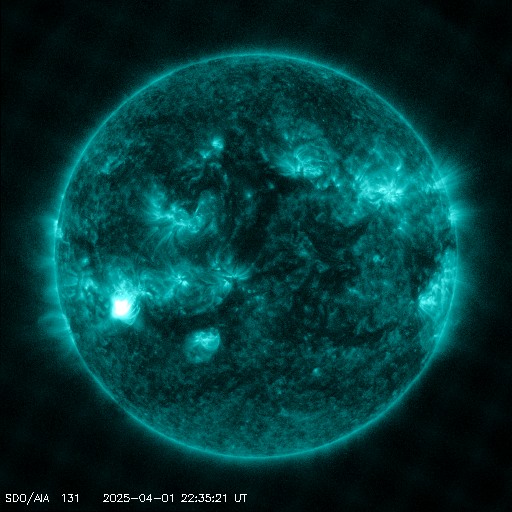Viewing archive of Thursday, 21 September 2023
Daily bulletin on solar and geomagnetic activity from the SIDC
Issued: 2023 Sep 21 1231 UTC
SIDC Forecast
Solar flares
M-class flares expected (probability >=50%)
Geomagnetism
Quiet (A<20 and K<4)
Solar protons
Quiet
| 10cm flux | Ap | |
|---|---|---|
| 21 Sep 2023 | 156 | 008 |
| 22 Sep 2023 | 158 | 007 |
| 23 Sep 2023 | 160 | 007 |
Solar Active Regions and flaring
There are eleven active regions visible on the disk. The strongest flare of the last 24 hours was an M8.2 one from NOAA AR 3435 (beta-delta magnetic field configuration), peaking at 14:19 UTC on 20 September. All the other regions have simpler alpha or beta magnetic field configuration. More M-class flares can be expected in the next 24 hours, X-class flares are possible but less likely.
Coronal mass ejections
A partial halo CME with angular width around 150 degrees was first seen at 06:12 UTC on 20 September by LASCO-C2. The CME originated in a region at the east limb, and the bulk of the material was traveling to the east. The CME was slow (speed around 350 km/s), no effect is expected at the Earth.
A second (faint) partial halo CME with angular width around 180 degrees was first seen at 14:12 UTC on 20 September by LASCO-C2. The CME was related to the M8.2 flare from NOAA AR 3435, the bulk of the material was traveling to the south. The CME had a speed around 800 km/s, an impact at the Earth can be expected on 23 September.
Coronal holes
Two small negative coronal holes crossed the central meridian yesterday, one at the equator and one in the northern hemisphere. A possible mild high speed stream may arrive to the Earth in 48 hours.
Solar wind
In the last 24 hours, the solar wind speed at the Earth has decreased to 430 km/s, and the interplanetary magnetic field has decreased to 4 nT. Similar slow solar wind conditions can be expected for the next 24 hours, unless we observe the (unlikely) arrival of the 17 and 18 September CMEs.
Geomagnetism
During the last 24 hours the geomagnetic conditions have reached active levels globally (NOAA KP 4) and unsettled levels locally (K_Bel 3). Mostly quiet to unsettled conditions can be expected in the next 24 hours, with possible active to minor storm levels if the CMEs from 17 and 18 September arrive.
Proton flux levels
Over the past 24 hours the greater than 10 MeV GOES proton flux was at nominal levels and is expected to remain so over the next 24 hours.
Electron fluxes at geostationary orbit
The greater than 2 MeV electron flux went above the 1000 pfu between 13:00 UTC and 20:00 UTC on 20 September, as measured by GOES 16. It may increase over the threshold again in the next 24 hours. The 24 hour electron fluence was at moderate levels, it is expected to stay at those levels for the next 24 hours.
Today's estimated international sunspot number (ISN): 197, based on 07 stations.
Solar indices for 20 Sep 2023
| Wolf number Catania | /// |
| 10cm solar flux | 156 |
| AK Chambon La Forêt | 017 |
| AK Wingst | 018 |
| Estimated Ap | 018 |
| Estimated international sunspot number | 179 - Based on 19 stations |
Noticeable events summary
| Day | Begin | Max | End | Loc | Strength | OP | 10cm | Catania/NOAA | Radio burst types |
|---|---|---|---|---|---|---|---|---|---|
| 20 | 1411 | 1419 | 1425 | ---- | M8.2 | 70/3435 |
Provided by the Solar Influences Data analysis Center© - SIDC - Processed by SpaceWeatherLive
All times in UTC
Current data suggests there is a slight possibility for aurora to appear at the following high latitude regions in the near future
Gillam, MB, Whitehorse, YT, Yellowknife, NTFairbanks, AK
Latest news
Latest forum messages
Support SpaceWeatherLive.com!
A lot of people come to SpaceWeatherLive to follow the Sun's activity or if there is aurora to be seen, but with more traffic comes higher server costs. Consider a donation if you enjoy SpaceWeatherLive so we can keep the website online!

Latest alerts
Wednesday, 2 April 2025
04:03 UTC - Hemispheric Power Index
The OVATION model predicts the Hemispheric Power Index to reach 50GW at 04:56 UTC
01:45 UTC - Geomagnetic activity
Active geomagnetic conditions (Kp4) Threshold Reached: 01:32 UTC
Tuesday, 1 April 2025
22:51 UTC - Solar flare
Moderate M2.5 flare
22:30 UTC - Radio Blackout
Minor R1 radio blackout in progress (≥M1 - current: M1.45)
Space weather facts
| Last X-flare | 2025/03/28 | X1.1 |
| Last M-flare | 2025/04/01 | M2.5 |
| Last geomagnetic storm | 2025/03/27 | Kp5 (G1) |
| Spotless days | |
|---|---|
| Last spotless day | 2022/06/08 |
| Monthly mean Sunspot Number | |
|---|---|
| February 2025 | 154.6 +17.6 |
| April 2025 | 152.5 -2.1 |
| Last 30 days | 130.7 -17.9 |




